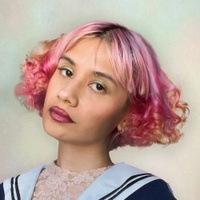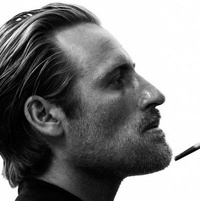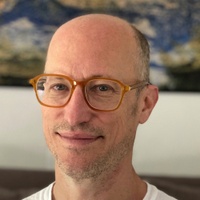As told to Sammy Maine, 2643 words.
Tags: Art, Photography, Process, Money, Mental health, Success, Failure.
On knowing your purpose
Multi-disciplinary artist Bunny Michael discusses not fitting in, finding your purpose and the journey it takes to reach the higher self.What were the pivotal choices you think that led you to the creative path you’re on today?
I’ve always been an artist since I was a kid but I think what really led me to be on the path that I’m on now, with my art, was trying to make it as an artist for a long time, since college in New York, and the ups and downs, and the feelings of not being good enough. The fear about that all built up in 2016 when I was going through a hard breakup and not knowing where my career was going. That was also when Instagram was becoming more of a thing, and people were becoming popular on Instagram for their art. So I was like, “That’s going to be great. I’ll do that.”
But it wasn’t going well. I was always judging myself based on, “What am I going to post?” That all culminated to this moment where I was just really depressed about who I was and not liking myself, and not feeling like I had any kind of direction. Things were really, really dark. I remember I was sitting at the edge of my bed and I was feeling like I didn’t want to live, and I just instinctually closed my eyes and I had this vision of another version of myself coming and putting their arm around me and holding me, and saying, “You’re okay. You’re enough just how you are. You don’t have to do this anymore.” It was such a relief.
I had been searching for so long for validation, from partners, and the music industry, or my parents, or Instagram or whatever. In that moment it became very clear that what I had been searching for was really just me letting myself be okay with myself. I really just needed my own approval. I clearly saw that I was creating this narrative, and that I was capable of changing that narrative. And from that moment on, it sparked this realization that I was using my art as a weapon to hurt myself. I was using it, rather than letting it give the love that it was practicing.
I realized that it wasn’t just about me. It was a spiritual awakening, but it was also the realization that being creative or being an artist isn’t really just about your own ego’s pursuits. It’s such a bigger story than just what your goals are––it’s being in collaboration with the divine creative energy of the universe. Through my own spiritual practice and budding with that moment, I was continuing to realize that I was able to take the ownership out of it because I felt that it was healing for me. It also helped other people realize that whatever their perspective was, that that’s really what being an artist is, and that there’s no such thing as good or bad art. It’s really just self-expression.
The reason why the so-called Masters or geniuses of art has been so institutionalized in ownership of white cis men is because those were the self expressions that were deemed important in culture. And so, the process of creating is really just this way to remind yourself, to connect your higher self to say, “What I want to express right now in this moment is just about this moment in time, and it’s just as valid as any other person’s expression.” It helped me realize that it was about a much bigger story than if my album was going to be popular or an Instagram post was going to get a lot of likes. Having that realization, ironically paved the way for the things that I actually did want to do. Even now, I still have to constantly check myself because if I allow myself to buy into that hierarchical thinking, even when something’s good, it’s like I’m setting myself up for that same kind of pain and that same kind of struggle buying into that belief system. So I’m in the process of trying to constantly dismantle or bring awareness to those hierarchical beliefs that we all carry around with us all of the time so I can actually enjoy my life and have a good time. Making art, actually enjoying it, and finding some happiness.
Did it alter the way you made art after that realization?
Do you remember those evil Kermit memes? That was right when those were popular. I thought they were funny but I thought, what if I made a meme with the higher self? The one I’m trying to access within myself. I made a post that was a higher self version of that with two of me photoshopped. I saw some people liked it. I also saw that Chani Nicholas liked it and she was somebody that I really looked up to. I still do. So all of these things were aligning, and I DM’d her, and she told me to keep going. So, I took out a piece of paper and I wrote down, “What do people need now?” And I wrote: needing a safe space to be their authentic self, needing to feel like they have a voice etc and then I wrote, “How can I help?” I decided from that moment that I would only put art in the world that fulfilled one of those things. I started making the memes as a spiritual practice every single day. I trained my brain to create from that perspective and aligned my spirituality with my art. It became a lot easier to be creative. I also just realized to not be so precious about it, because all art really is just a moment in time, and there’s going to be so many more moments. It wasn’t as serious as I thought. It didn’t define me, even though it was such an important part of my life. I didn’t need it to be good enough. That also improved my relationship with it, because I wasn’t using it to complete me.
Did it change your relationship with failure?
It did, but it’s a constant practice. I still have those thoughts for sure but I have a much better foundation now to get back to. When I notice myself getting to feelings of failure or feelings of not being good enough, then I am like, “Well, I need to take a step back and journal, or meditate,” or read something that’s going to remind me what’s really important right now. All of this is an illusion, it’s not real.
You moved to New York from Texas: did you find a community there?
Being involved in performing in Brooklyn and in Bushwick, and being around artists who were doing cool, brave, weird things helped me to realize that there weren’t any rules as far as performance goes, or as far as being an artist. The fact that I had to do everything on my own forced me to learn how to do a lot of different types of stuff. I went to college for theater, but then when I got to New York, I was like, “You can just be an artist. You don’t have to do one thing.” And now moving away from it, I realize it really was so integral, in some ways, to constantly see people doing stuff. And now being upstate, it’s different.
You mentioned your degree in theater, but you’re a writer, musician, and visual artist. Do you think that studying one area of creativity helped you with the others?
I think the ways in which I didn’t fit in helped me. Just being a brown person and attempting to get a degree in classical theater and realizing I didn’t feel very connected to that kind of thing. I just didn’t see myself. If I was going to be an artist, it was really about embracing my authenticity. My authenticity was my greatest asset, and it helped me see the ways in which I was different was actually a good thing. It was a painful process to realize that, because for a long time I just felt not good enough or that I was never going to look the part. That was in the 2000s, so things are a lot different now as far as that goes. It was like all the rejection helped.
You released your first solo EP in 2014 and then you have a book coming out next year. Looking back on how you created things 10 years ago, what do you think are the biggest creative lessons that you’ve developed?
I’ve had to let go of this idea of being famous for being cool. I’m just being real. I realized that that was some kind of fantasy that I was really seduced by—and I think a lot of artists are. Over time I realized that I had to have a purpose and make it about so much more than just being famous, or looking cool in front of people. You don’t think about it that way when you’re in it necessarily, but that’s what so much of it is. I needed to prioritize my own happiness, which made me really have to think about why I was an artist at all. In order for me to be able to make it sustainable and be able to live off of it, I had to make it about something more than myself, like I was saying, because ultimately it is for other people.
Cultivating a relationship with my audience has also changed; before it was all about, if I make something good, then I’m going to have that relationship and now I realize it’s so much more than that, it’s just about valuing people. It’s not always being more, but actually really understanding that the people you have in your corner are real people. It’s so cool that they even listen to your song, or go to your show, or listen to the podcast. It helps me feel a lot less alone, it helps me feel like I have community.
It’s been a healing process to ask: “Why am I doing this?” And, “Why is it valuable to me?” and “Why would it be valuable to somebody else?” And as long as I know that, as long as I know my purpose, the form ultimately is secondary. It could be a book, it could be music, it could be whatever, who knows what it’s going to be 10 years from now, but I know that the purpose won’t change. I’m here to awaken to my own worth and help others see theirs. There’s always going to be something that I can do in whatever creative way.
Do you feel a certain responsibility in having the platform that you do? And does that help or hinder your process?
I do feel a lot of responsibility. With the podcast, for example, I feel a tremendous responsibility because people send in questions and they want to get the higher self perspective. It’s on all sorts of topics, from relationships to death to trauma and I’m not a therapist and I’m very open about that, so what I do try to do is get them into a place where they realize they already have the answer; helping them connect to their higher self, which is really just the perspective that they are already enough. When you remind somebody about that, it’s so much easier to see the path forward in your struggle. On the more difficult side is social media and feeling a responsibility to be posting every single day. I’m trying to do things that make people happy, but I also have to keep myself happy, and so I have to find a balance. I’m still in my own healing process and it’s constantly showing me the boundaries that I need to have, or if I need to take time off. I’m basically just sharing the things that I’m going through on there. I’m healing with everybody else. I have the same struggles.
What boundaries do you put in place in those digital spaces?
I’m still working on those boundaries. I actually had to put one in place that has been very helpful. Basically, I stopped using my image on the Bunny Michael Instagram as much. I was making videos there all of the time and using my image on the memes. Probably a few months ago, I went to mostly just text and that was actually really helpful emotionally, because I didn’t realize how hard it is to be looking at yourself and then looking at the likes and the comments; it’s a hard thing to be doing every single day.
What would you say to folks who are trying to reach a higher self in order to create better work? Do you think that folks need to do that in order to create honest work?
No, because I think whatever you’re creating is just where you’re at at the moment. I don’t think there’s any right or wrong way to be you in the moment, or that you necessarily have to make work about love or higher states of consciousness or anything like that. But I do think it’s going to help your work be more sustainable because when you are so identified with the outside world, you’re going to be on this constant rollercoaster because that’s just the nature of the world that we live in. Nothing is set in stone, everything is temporary, everything is up and down. Obviously, you can’t predict what’s going to happen in the world. We don’t even know what technology is going to exist in a couple years. I feel like the world is the way it is because people don’t realize that. They don’t realize that they’re already worthy, so they’re grabbing, grabbing, grabbing. So we have so much greed and unnecessary suffering. So yes, personally, I think that’s the only way our species actually survives. But on another level, in your personal life, it just makes it a lot easier to keep going, because if you really want to make art for the rest of your life, you can’t expect that your only ability to do that is for a capitalist system to validate it. That’s just not what it was designed to do.
No one’s going to win that way.
And even if you do, it’s not going to be enough. You see that everywhere, all these people who supposedly have all of the success and all of the money, and it’s definitely not enough for them. I don’t think it’s about the right or wrong way. It’s easier to do it for a deeper purpose than that.
Bunny Michael recommends:
Doing something you’re really “bad” at. Not so you can get good at it, but as a reminder not to take yourself too seriously. (for me it would be rollerskating or dribbling a basketball.)
Saying uplifting things to yourself in the mirror. (If it feels cringy- ask yourself, “why does it feel cringy to give myself a compliment?”)
Nerding out on history podcasts/docs/books. (I love thinking about how amazing and complex humanity is and how much we can learn from past mistakes.)
Thanking your body for all the things it does for you. (examples: Thank you butt for being squishy so I can sit comfortably. Thank you stomach rolls for being soft and making room for all the yummy food I like. Thank you mustache for being here even though as a teenager I tried to bleach you away.)
Singing made up songs to your pets. (I could drop a couple albums by now)




